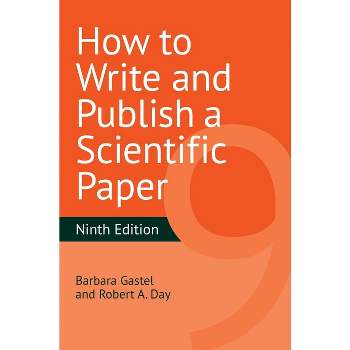Sponsored
Scientific English - 3rd Edition by Robert Day & Nancy Sakaduski


About this item
Highlights
- This entertaining and highly readable book gives anyone writing in the sciences a clear and easy-to-follow guide to the English language.
- About the Author: Robert A. Day is professor emeritus at the University of Delaware, Newark, DE.
- 248 Pages
- Language + Art + Disciplines, Writing
Description
About the Book
This entertaining and highly readable book gives anyone writing in the sciences a clear and easy-to-follow guide to the English language.
English is often regarded as one of the most difficult languages to master. Yet while the English language has a vocabulary of upwards of 500,000 words, it only uses nine parts of speech, and all of these words fall into one (or more) of those nine categories. Scientific English: A Guide for Scientists and Other Professionals, Third Edition contains many simple revelations like this that make effective scientific writing in English easy, even for those whose fluency is in another language.
The book is organized around a basic guide to English grammar that is specifically tailored to the needs of scientists, science writers, science educators, and science students. The authors explain the goals of scientific writing, the role of style, and the various kinds of writing in the sciences, then provide a basic guide to the fundamentals of English and address problem areas such as redundancies, abbreviations and acronyms, jargon, and foreign terms. Email, online publishing, blogs, and writing for the Web are covered as well. This book is designed to be an enlightening and entertaining read that can then be retained as a practical scientific writing reference guide.
- Includes cartoons and humorous illustrations that help reinforce important concepts
- Provides a glossary that allows readers to easily reference the meanings of grammatical terms used in the book
- Incorporates a wide variety of quotations to provide humor, make points, or reinforce key concepts
- Includes an entire chapter on electronic media as well as new material on self-editing
Book Synopsis
This entertaining and highly readable book gives anyone writing in the sciences a clear and easy-to-follow guide to the English language.
English is often regarded as one of the most difficult languages to master. Yet while the English language has a vocabulary of upwards of 500,000 words, it only uses nine parts of speech, and all of these words fall into one (or more) of those nine categories. Scientific English: A Guide for Scientists and Other Professionals, Third Edition contains many simple revelations like this that make effective scientific writing in English easy, even for those whose fluency is in another language. The book is organized around a basic guide to English grammar that is specifically tailored to the needs of scientists, science writers, science educators, and science students. The authors explain the goals of scientific writing, the role of style, and the various kinds of writing in the sciences, then provide a basic guide to the fundamentals of English and address problem areas such as redundancies, abbreviations and acronyms, jargon, and foreign terms. Email, online publishing, blogs, and writing for the Web are covered as well. This book is designed to be an enlightening and entertaining read that can then be retained as a practical scientific writing reference guide.Review Quotes
"Scientific English also does a very good job of showing how one can improve individual sentences. Its chief virtues are its wealth of examples (new in this edition) and the special care it gives to the trickiest parts of scientific writing. . . . Scientific English overall is an excellent guide for those people writing scientific English, from peer-reviewed journals to blogs, online comments sections, grants, and social media." --Technical Communication
"This book is an excellent one for reference. It should be a welcome addition to the medical writer's library." --American Medical Writers Association (AMWA) JournalAbout the Author
Robert A. Day is professor emeritus at the University of Delaware, Newark, DE.
Nancy Sakaduski is a writer and consultant based in Chadds Ford, PA.









